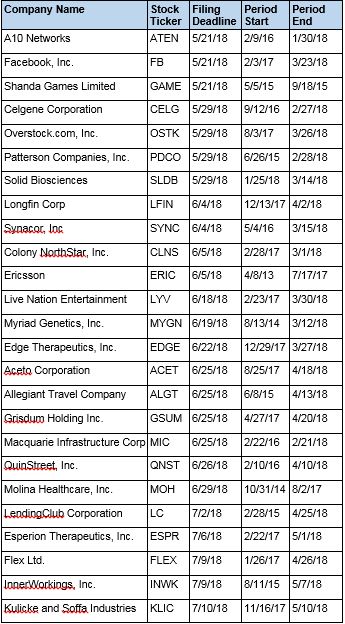LC Class Action Report
Levi & Korsinsky, LLP
May 14, 2018
On May 2, 2018, investors sued LendingClub Corporation (“LendingClub” or the “Company”) in United States District Court, Northern District of California. The federal securities class action alleges that plaintiffs acquired LendingClub stock at artificially inflated prices between February 28, 2015 and April 25, 2018 (the “Class Period”). They are now seeking compensation for financial losses incurred upon public revelation of the Company’s alleged misconduct during that time. Here’s everything you need to know about the LendingClub class action lawsuit (LC class action lawsuit):
Summary of the Allegations
Company Background
LendingClub (NYSE: LC) runs an Internet marketplace platform that “connects borrowers and investors in the United States.”
According to its website, the Company has been in business since 2007 and has helped “millions of people take control of their debt, grow their small businesses, and invest for the future.” Specifically, it helps Americans secure business and personal loans; refinance car loans; and financing for healthcare. It also offers investment opportunities for individuals and financial institutions.
The Company claims that it is committed to reinventing credit and investing; doing what is right; providing world-class experiences and leveling the financial playing field.
Summary of Facts
LendingClub and five of its current and former officers and/or directors now stand accused of deceiving investors by lying and withholding critical information about the Company’s business practices during the Class Period.
Specifically, they are accused of omitting truthful information about the validity of certain promises made to consumers and its compliance with certain privacy laws from SEC filings and related material. By knowingly or recklessly doing so, they allegedly caused LendingClub’s stock to trade at artificially inflated prices during the time in question.
The truth came out in a press release issued by the Federal Trade Commission (FTC) on April 25, 2018. In it, the FTC announced that it had filed a complaint against the Company alleging violations of the FTC Act. Specifically, the FTC alleged that LendingClub falsely promised consumers that they would receive a loan with “no hidden fees”; and the Gramm-Leach-Bliley Act by “failing to provide customers with a clear and conspicuous privacy notice…”
A closer look…
As alleged in the May 2 complaint, the Company repeatedly made false and misleading public statements throughout the Class Period.
For instance, on a form filed with the SEC on February 27, 2015, the Company said in pertinent part: “All of the installment loans offered through our marketplace feature a fixed rate that is clearly disclosed to the borrower during the application process, with fixed monthly payments, no hidden fees and the ability to prepay the balance at anytime without penalty.”
On another form filed with the SEC on February 22, 2016, LendingClub described its privacy policy, saying: “We have a detailed privacy policy, which complies with GLBA and is accessible from every page of our website.”
What the Company didn’t say, however, was that the promise made to consumers about “no fee” loans was inaccurate and that its privacy policy did not comply with the Gramm-Leach-Bliley Act.
Impact of the Alleged Fraud on LendingClub’s Stock Price and Market Capitalization
| Closing stock price prior to disclosures:
|
$3.26 |
| Closing stock price the trading day after disclosures:
|
$2.77 |
| One day stock price decrease (percentage) as a result of disclosures:
|
15.03% |
The following chart illustrates the stock price during the class period:
Actions You May Take
If you have purchased shares during the Class Period, you may join the class action as a lead plaintiff, remain a passive class member, or opt out of this litigation and pursue individual claims that may not be available to the class as a whole.
NOTE: The deadline to file for lead plaintiff in this class action is July 2, 2018. You must file an application to be appointed lead plaintiff prior to this deadline in order to be considered by the Court. Typically, the plaintiff or plaintiffs with the largest losses are appointed lead plaintiff.
In order to identify your potential exposure to the alleged fraud during the time in question, you may wish to perform an analysis of your transactions in LendingClub common stock using court approved loss calculation methods.
Recently Filed Cases
Listed below are recently filed securities class action cases being monitored by us, along with the class period and the deadline to file a motion to be appointed as the Lead Plaintiff in the action. Please contact us if you would like an LK report for any of these cases:
About Us
| This information is provided for general information purposes only, and should not be construed as legal advice, nor does it establish an attorney-client relationship with Levi & Korsinsky LLP. Any and all information herein is simply an opinion based on publicly available information and should not necessarily be construed as fact. For more information, please visit our website at www.zlk.com.
Attorney Advertising
|
Levi & Korsinsky is a leading securities litigation firm with a hard-earned reputation for protecting investors’ rights and recovering losses arising from fraud, mismanagement and corporate abuse. With thirty attorneys and offices in New York, Connecticut, California and Washington D.C., the firm is able to litigate cases in various jurisdictions in the U.S., England, and in other international jurisdictions.
Levi & Korsinsky provides portfolio monitoring services for high-net worth investors and institutional clients. Our firm also assists investors in evaluating whether to opt-out of large securities class actions to pursue individual claims.
For additional information about this case or our institutional services, please contact us.
